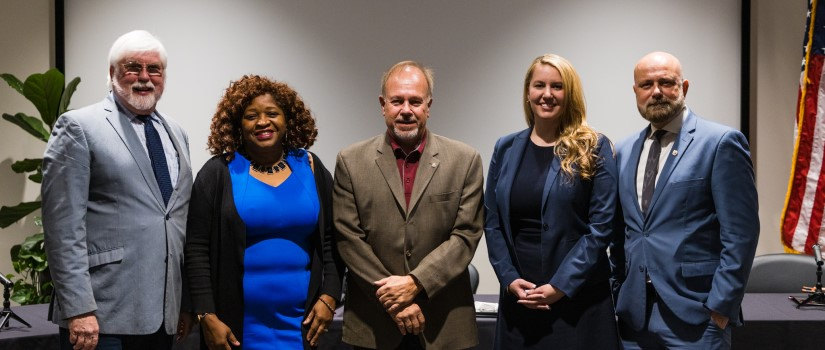Now Live: Discover USC 2022 keynote video
Click the banner above to watch the video on this page or click here to watch it on Youtube.
Since 2017, Discover USC has showcased the wide array of research, scholarship, creativity and leadership happening across the University of South Carolina system. This annual showcase provides excellent presentation opportunities in these areas for undergraduate and graduate students, medical scholars and postdocs working in every discipline, across every USC campus.
For Discover USC 2022, we expanded the scope of Carolina research excellence featured at the event with a new, re-tooled keynote featuring some of the university’s distinguished faculty researchers. Instead of the traditional lunchtime keynote speech, we launched a special keynote panel discussion video in advance and welcomed the outstanding faculty panelists to Discover USC 2022 as Distinguished Research Ambassadors.
These Distinguished Research Ambassadors spent the day at Discover USC 2022, visiting the poster sessions to talk with the presenters, enjoying lunch with participants and taking part in all the features of the day. This way, their keynote conversation served as a springboard to further discussion with the university research community at Discover USC.
2022 Discover USC Distinguished Research Ambassadors
Dr. Gloria Swindler Boutte, Associate Dean of Diversity, Equity and Inclusion and Carolina Distinguished Professor
Department of Instruction and Teacher Education, College of Education
Dr. Gloria Boutte has devoted her career to studying how K-12 educators can achieve equity in teaching for students of color. Within this field, known as equity methodology, Dr. Boutte focuses on two important lines of research. The first is culturally relevant pedagogy, which examines how teachers can educate students, particularly African Americans and other students of color, in effective ways. Dr. Boutte’s research also focuses on African Diaspora literacy, which aims to develop teaching methods to help students understand the language, history, politics, economics, religion and cultural traditions of people in the African Diaspora. To further her research goals, in 2016 Dr. Boutte founded the Center for the Education and Equity of African American Students with a mission of working in the community to model exemplary education practices, conduct cutting-edge education research, provide a platform for public discourse on educational equity and offer resources and advocacy to support children, families, educators and policymakers.
Dr. Timothy Mousseau, Professor
Department of Biological Sciences, College of Arts and Sciences
Dr. Tim Mousseau’s early evolutionary biology research training examined how organisms adapt to changing environments. This early work prepared him well for a career that, in the past 20 years has focused on studying the effects of radiation on organisms living in nuclear disaster areas including Chernobyl and Fukushima. Dr. Mousseau and his research colleagues working across Europe, Japan and the United States established the USC Chernobyl + Fukushima Initiative, which has pioneered the use of ecological, genetic and dosimetric technologies to unravel the health and environmental consequences of chronic low-dose radiation exposure resulting from the Chernobyl and Fukushima disasters. Through the initiative, Mousseau and colleagues from around the world have made novel discoveries, published more than 130 papers and attracted international media attention to help get the word out on the biological consequences of nuclear disasters for animals and plants.
Dr. Melissa Nolan, Assistant Professor
Department of Epidemiology and Biostatistics, Arnold School of Public Health
Dr. Melissa Nolan’s field of study, infectious disease epidemiology, rose to global prominence as the world moved through the COVID-19 pandemic. Before the pandemic, Dr. Nolan’s research focused on reducing transmission of vector-borne diseases spread by insects like mosquitoes, ticks and kissing bugs. But, with the advent of COVID-19, she found herself shifting gears to work with the SC Strong project, developing research data that South Carolina policymakers and public health officials could use to inform the pandemic response. Building on the success of that work, early in 2022 Dr. Nolan and her SC Strong colleagues garnered a $5.4 million contract to continue their collaborations with a project aimed at addressing the health disparities resulting from, or worsened by, the pandemic through elevating minority voices and developing novel diagnostic testing soloutions. In addition to her COVID-19 research, Dr. Nolan continues to study vector-borne diseases that disproportionately affect people in poverty through the Entomological Society of America’s Science Policy Fellows program, an NIH R01 grant focused on developing innovative mosquito control tools, a Prisma Health grant to identify undiagnosed Latinx infections in South Carolina and grant collaborations with other colleagues on emerging vector-borne diseases throughout the Americas.
Dr. Mark Smith, Carolina Distinguished Professor and Director of the Institute for Southern Studies
Department of History, College of Arts and Sciences
Although he is originally from England, Dr. Mark Smith developed a deep interest in the history of the Southern United States during his time as an undergraduate student at the University of Southampton, and followed that interest to a fascinating career in the study of Southern history and culture, and sensory history. Since that early moment of inspiration, Dr. Smith has authored seven books on topics ranging from the history of slavery in the American South to sensory histories of the nineteenth century and the Civil War, co-authored an eighth book on Hurricane Katrina, edited several volumes and published scholarly articles in many highly prestigious academic journals. Dr. Smith also lectures widely and participates in popular media. He established and now hosts the Take on the South Podcast, has reviewed books for the Wall Street Journal and even writes pieces on mixed martial arts for bleacherreport.com.
